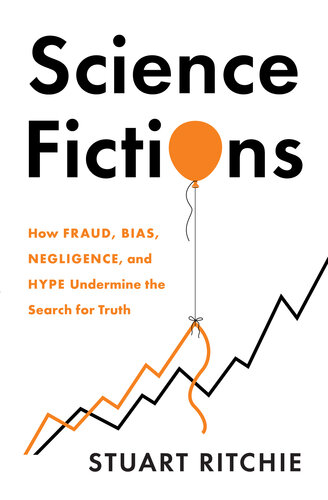
Science Fictions
How Fraud, Bias, Negligence, and Hype Undermine the Search for Truth
کتاب های مرتبط
- اطلاعات
- نقد و بررسی
- دیدگاه کاربران
نقد و بررسی

April 15, 2020
An unnerving yet much-needed analysis of why so many scientists publish nonsense. A lecturer in social, genetic, and development psychiatry, Ritchie begins with an account of a respected Cornell psychology professor asking subjects to guess an object concealed behind one of two screens. As expected, they succeeded about half the time--unless the object was lurid, such as a pornographic picture. Then the success rate was over 53%, which, according to his 2011 paper, was "statistically significant" and evidence for extrasensory perception. The media trumpeted the study, and the professor appeared on talk shows. Good studies are repeatable, but when researchers tried it again, they found nothing. Subjects guessed correctly about half the time, pornography or not. The researcher remains a respected Cornell professor. What happened? Ritchie answers with a frighteningly well-documented follow-up to a 2005 article entitled "Why Most Published Research Findings Are False." He makes it clear that fraud happens regularly. Asked anonymously, 2% of scientists admit to faking data, so the true incidence is undoubtedly higher. Far more disturbing is the massaging of data. As one wit said, "if you torture the data enough, it will confess to almost anything." Thirteen percent of papers contain serious errors, and most favor the author's conclusion. Bias distorts research, and serious, well-meaning scientists offend regularly. Everyone deplores media hype, but scientists increasingly litter papers with exuberant adjectives like "innovative," "unique," and "groundbreaking." Ritchie admits that editors, academics, and foundations are growing less tolerant of scientists who game the system, but the difficulty is that scientists, being human, pursue rewards: jobs, promotions, research grants, fame. These follow dramatic announcements and media attention. Career advancement depends on sheer number of publications, and quality becomes irrelevant. Reform requires that scientists search for nature's secrets purely for the joy of discovery. Some already follow this ideal, but readers may wonder if it will catch on. A timely, hair-raising must-read.
COPYRIGHT(2020) Kirkus Reviews, ALL RIGHTS RESERVED.

May 4, 2020
In this bracing indictment, Ritchie (Intelligence: All That Matters), a lecturer at the Institute of Psychiatry, Psychology and Neuroscience at King’s College, charges that in recent decades the scientific establishment has become host to a “dizzying array of incompetence, delusion, lies and self-deception.” He names outright “fraudsters” such as condensed matter physicist Jan Hendrik Schön, who falsified data supporting his 2001 claim to have invented a carbon-based transistor to replace the silicone microchip, and shows how scientists can more subtly massage data by “p-hacking,” or nudging experiment results to show significant effect. Ritchie sees software such as Photoshop as having significantly contributed to the rise of deceptions, as when, in 2004, South Korean biologist Woo-Suk Hwang manipulated photos of cells to back up his claim of having cloned a human embryo. Regarding popular scientific literature, he takes aim at overhype, using as an example Matthew Walker’s 2017 bestseller Why We Sleep, for using what he considers to be thin evidence to insist sleeping eight hours a night is not only healthy but vital. On academe, Ritchie suggests the pressure to publish has also encouraged scientists to exaggerate results. Thorough and detailed, this is a sobering and convincing treatise for anyone invested in the intellectual credibility of science.

Starred review from July 1, 2020
According to British psychologist Ritchie (Psychiatry Ctr., King's Coll. London; Intelligence: All That Matters) objectivity, accuracy, and impartiality--cornerstones of the scientific process--have been replaced by the pressure to publish attention-grabbing, statistically significant, positive results. Much of the author's critique focuses on the widespread manipulation of statistics by scientists who game the publication system to make their experimental results more publishable, allowing them to get away with faked data, exaggerated claims, and poor experimental design. Alarmingly, Ritchie claims this situation is not owing to a few corrupt people but rather "an entire culture gone awry." Liberally documented with amazing stories of scientific misconduct at the highest levels (particularly the blatant fraud of a superstar trachea transplant surgeon who concealed the fact that his patients died), the book concludes with a discussion of how to restore scientific rigor and integrity to a broken system. Though much of the author's discussion involves statistical techniques, they are so clearly explained that nonspecialists can easily follow. VERDICT An uncompromising examination of the collision between the ideals of science and the realities of scientific publishing. Highly recommended for popular science readers curious about what lurks behind science headlines.--Cynthia Lee Knight, formerly with Hunterdon Cty. Lib., Flemington, NJ
Copyright 2020 Library Journal, LLC Used with permission.

























دیدگاه کاربران